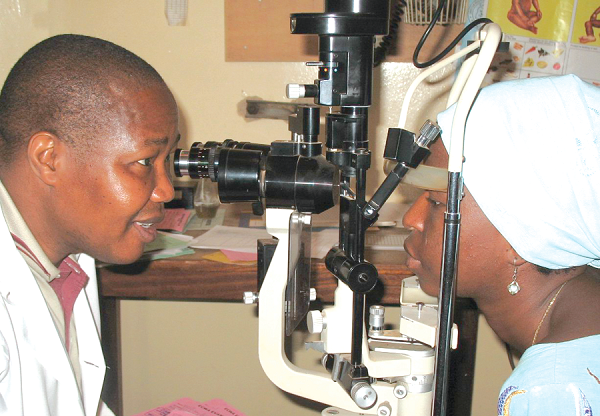
91 Eye doctors in Ghana 68 Work in Greater Accra alone
There are only 91 ophthalmologists (medical doctors specialising in the anatomy, functions and diseases of the eye) in Ghana.
The Volta and Western regions have one each to cater for the growing number of people who need eye surgical operations.
What makes the situation even more serious is that within the next 10 years, more than half of the 91 ophthalmologists are scheduled for retirement.
These were made known at the 28th annual general meeting of the Ophthalmological Society of Ghana (OSG) held in Sunyani last weekend on the theme: “Universal Eye Health: A Global Action Plan”.
Blind/ visually impaired
According to a Consultant Ophthalmologist, Dr Boateng Wiafe, who is the Treatment Adviser, Operation Eyesight Universal, both refractive error and cataract, which contribute to a total of 75 per cent of the world’s blindness and visual impairment, are avoidable.
Delivering the keynote address at the meeting, he
Dr
Dr Boateng said efforts were also being made to encourage more young doctors to take ophthalmology as a career to avert
He stated that the introduction of ophthalmology at the degree level for nurses had also ensured that ophthalmic nurses pursued further courses in the field instead of venturing into other areas because of lack of career progression.
Dr Boateng, however, called for measures to ensure that human resources within the eye care sector were maintained and evenly distributed across the country.
In addition, he said governments should ensure free services to the poorest and include eye care in health insurance schemes.
The President of the OSG, Dr Michael Gyasi, expressed his happiness about the current 20 residents in training who were waiting to complete their three-year probation in order to join the society.
“This is the first time in our history that we have about 20 residents in training and this is laudable,” he stated, explaining that “for us to achieve a sustainable growth against the backdrop of the retirement forecast, however, this number has to double”.
Dr Gyasi said the society needed to ensure that its trainees got adequate hands-on skill sets, adding that: “If for nothing at all, their cataract surgical skills, including phacoemulsification, must be spot on.”
There are 285 million people around the world who are blind or visually impaired, with 90 per cent living in developing countries.
The common causes of visual impairment are